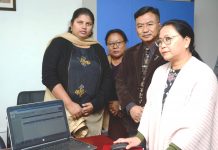They’ve been at the forefront of social and political activism in Manipur but women haven’t got their due share in power yet. The forthcoming Assembly elections hold out little hope that things will change. Sonia Sarkar looks into the reasons why
Sonia Sarkar
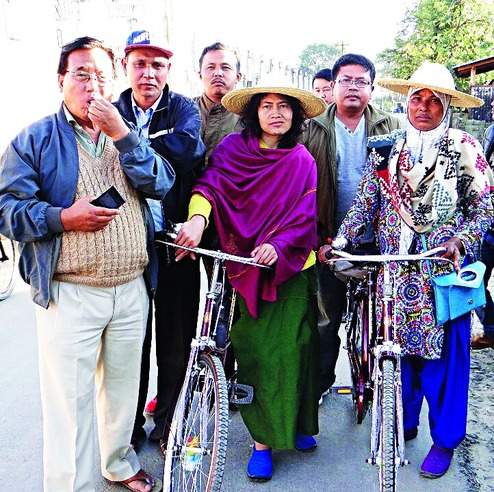
Imphal. It’s 4am. At five degrees, 44-year-old Irom Sharmila Chanu warms up with an hour-long suryanamaskar. She boils some rice and laphu tharo (banana bud) for breakfast. At 7am, donning her green phanek and yellow pullover with a pink shawl, she prepares for a long day ahead. A water bottle, hat and a scarf in the bicycle basket, she sets off for Thoubal, 30 kilometres away.
“I like to start early. I get more hours of the day to meet people,” says Sharmila, famed rights activist and co-convener of the newly formed People’s Resurgence and Justice Alliance.
She is having to work hard. After all, she is taking on the three-time sitting chief minister of Manipur and Congress leader, Okram Ibobi Singh, in the forthcoming Assembly elections. Also, being a woman politician in Manipur isn’t easy.
Bharatiya Janata Party’s Indira Oinam, who has been into politics for the past eight years, knows better. “As women politicians, we are made to feel that we are intruding into the man’s world and every day, we need to fight this patriarchal mindset,” says Indira, who too has pitted herself against Ibobi Singh (this is her second attempt at unseating him).
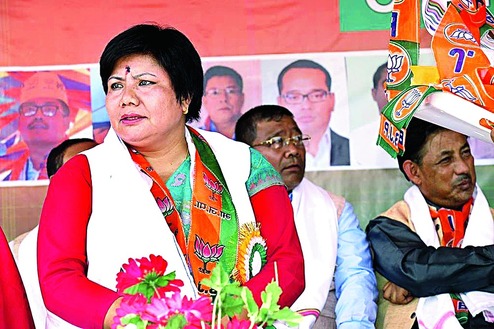 The irony is that women feel politically left out in a state where they have been at the forefront of many a battle. “Having women participate in social agitations is one thing, giving them their rights in politics quite another. We have failed to do the latter,” says S. Mangi Singh, professor of political science at Manipur University.
The irony is that women feel politically left out in a state where they have been at the forefront of many a battle. “Having women participate in social agitations is one thing, giving them their rights in politics quite another. We have failed to do the latter,” says S. Mangi Singh, professor of political science at Manipur University.
There is only a handful of women in politics in Manipur. In the outgoing state Assembly, only three of the 60 MLAs are women. And for the coming Assembly, only two women other than Sharmila and Indira have entered the fray. Both are from Congress – Akoijam Mirabai Devi from Patsoi constituency in west Imphal and Nemcha Kipgen, a Kuki from the Kangpokpi constituency in Sadar Hills. The celebrated boxer and the Rajya Sabha MP, Mary Kom, is likely to be courted by the BJP for campaigning.
“There are only a few women candidates because it’s predominantly a patriarchal society, so the real decision-making power lies with men,” Mangi Singh says.
But it’s not that women in Manipur have no say in society at all. Two Nupi Lan (women’s agitation) movements, the first in 1904 and then in 1939, both against the British, became the defining moments of woman power in the state. Protests led by Rani Gaidinliu against the British, forcing them to leave Manipur, is a local legend. In 1925 and 1932, women also led agitations against the increase of water tax by the then king.
When the late Indira Gandhi was addressing a gathering in Imphal’s polo ground in 1969, women staged a black flag vigil to press their demand for statehood. Curfew was imposed but three years later, statehood was granted.
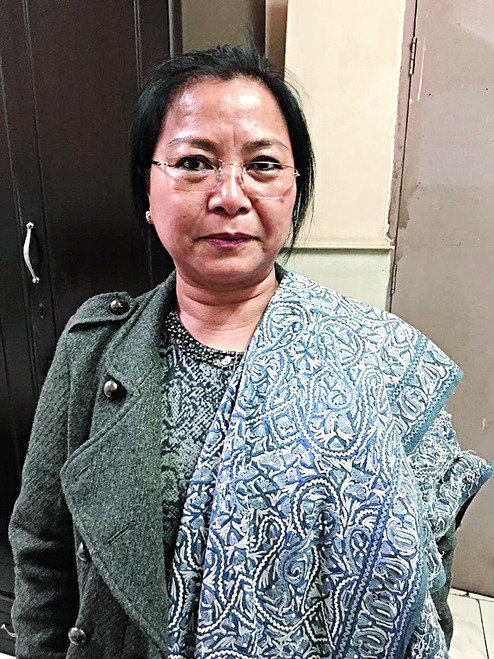 An all-women’s campaign for prohibition, called Nisha Bandh, was much highlighted in the 70s. Irom Sharmila’s 16-year-long fast to repeal the Armed Forces Special Powers Act (AFSPA) is iconic, of course. Also, Meira Paibis, or women torchbearers, redefined public protests when 12 naked Manipuri women agitated against the killing of 34-year-old Thangjam Manorama Devi by security forces. Imphal’s all-women Ima market, centre point of the Nupi Lan movement, is considered to be a sign of women’s economic progress.
An all-women’s campaign for prohibition, called Nisha Bandh, was much highlighted in the 70s. Irom Sharmila’s 16-year-long fast to repeal the Armed Forces Special Powers Act (AFSPA) is iconic, of course. Also, Meira Paibis, or women torchbearers, redefined public protests when 12 naked Manipuri women agitated against the killing of 34-year-old Thangjam Manorama Devi by security forces. Imphal’s all-women Ima market, centre point of the Nupi Lan movement, is considered to be a sign of women’s economic progress.
“But in politics, women are treated as second-class citizens,” says 57-year-old Akoijam Mirabai, the social welfare and co-operatives minister. “People feel women are not committed to politics and their focus is the family.”
That’s the reason Mirabai never got married. “I wanted to tell people that I am serious about politics,” she says.
But the journey wasn’t easy for her when she joined politics in 1980 at the age of 17 – first as part of the Congress Sevadal and then the Mahila Congress. “My neighbours used to tell my parents that my image as a woman would be tarnished if I joined politics. I fought every gaze and every taunt because I knew politics was my true calling,” says Mirabai, who hails from Taobungkhok in west Imphal.
There are several deterrents for women. “Women lack winnability. Even if we want to give tickets to women, we would lose out seats because the BJP might just put up stronger male candidates there. Social goals and political gains cannot go hand in hand,” says a Manipuri Congress leader.
In contrast to national politics, where political parties often foreground women candidates, keeping their glamour quotient in mind, Manipur politicians don’t look at “glamour” as a valid reason to give tickets to women. But glamour or no glamour, Indira thinks, women should get a chance. “When our PM talks about beti bachao, beti padhao, women should get priority in politics,” she says.
A senior BJP leader in Imphal argues that elections are all about money and muscle power and women fail to exhibit both, in most cases. “Indira will fight against Ibobi Singh but we are not projecting her as the CM candidate,” says the BJP leader.
Indira, who fetched 3,668 votes in the 2012 elections, the second largest tally any BJP candidate swung in Manipur, has faced such a bias once before. In 2014, Indira was one of the hopefuls for the Inner Manipur parliamentary constituency but the party chose R.K. Ranjan Singh, instead. Women members of the party protested openly, but quite in vain.
In the past, women in Manipur have mostly contested elections under the legacy of their powerful husbands in politics. For example, former Manipur King Bodhachandra’s wife, Srimati Ishwari Devi, contested from the Inner Manipur parliamentary constituency in 1952, but lost.
The first elected woman in the Manipur state Assembly, Hangmila Shaiza, came into politics in 1990 after her husband and the former chief minister, Yangmaso Shaiza, died. Similarly, K. Apabi Devi won the 1992 by-elections after MLA K. Bira Singh died in a plane crash. Both benefited from “sympathy votes”, writes Binarani Devi in her paper, “Electoral Politics and Women”.
Again, Wahengbam Leima Devi, wife of Angou Singh, contested and got elected from Singh’s seat in 2000, only after Singh became an MP. Landhoni Devi, wife of Ibobi Singh, contested and won from the Khangabok constituency in 2007 and 2012 after Singh vacated it as he could retain only one, and that was Thoubal. In Ibobi Singh’s party, patriarchy rules. “Now that his son, Okram Surajkumar, is contesting, Landhoni Devi has had to sacrifice her seat. A woman has to make way for the male members of the family,” a state Congress leader says.
Mirabai feels that her singlehood is certainly a boon for her as a politician. “Being single, I don’t have the compulsion to listen to my husband, at least,” she laughs.
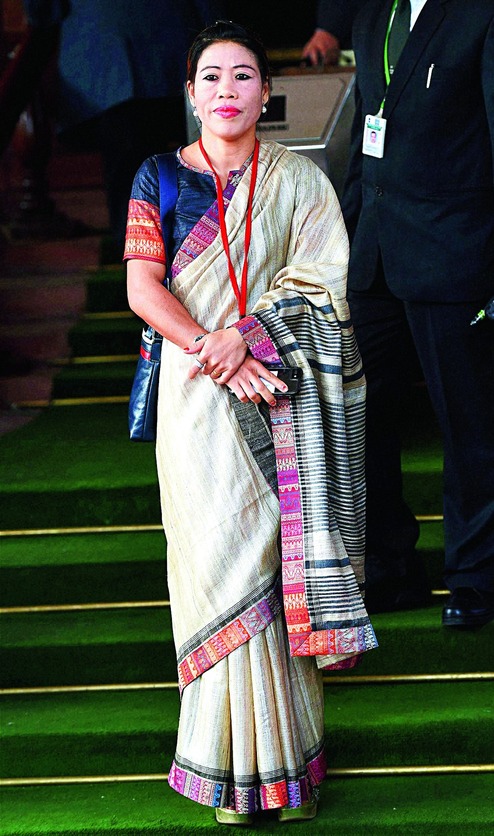
Mirabai and Nemcha are the only two women to have made a mark in mainstream Manipuri politics without any political patronage. “When I joined politics in 2012, many discouraged me but now they are happy to see that I have sustained,” says Nemcha, who left her job as a nurse in Delhi’s All India Institute of Medical Sciences to join politics.
Nemcha – her husband S.T. Thangboi Kipgen is chairman of the United People’s Front, a Kuki militant group – claims one of her biggest achievements is forcing the government to create the new district of Kangpokpi – a longstanding demand of the people of her constituency. The creation of seven new districts, which led to an economic blockade by the Nagas, is one of the issues in the Manipur elections, besides the Centre’s secret peace deal with the NSCN-IM, corruption, unemployment and repeal of AFSPA.
But issues related to women such as compensation to widows of gun violence and women’s empowerment are also likely to enter party manifestos.
In fact, political parties often float women self-help groups to generate funds. In Manipur, a woman’s entry into politics is mostly through social work. Both Indira and Mirabai were well-known social workers before joining politics. But few make it to the decision-making level of the party.
Here, another irony. Female voters have outnumbered male voters in almost every Manipur election. In 2012, 6,94,893 women cast their votes as opposed to 6,31,223 men. The truth remains, though, that – as Sharmila herself rues – even women voters lack confidence in women candidates. She’s set on contesting nevertheless.
Source: Telegraph India

